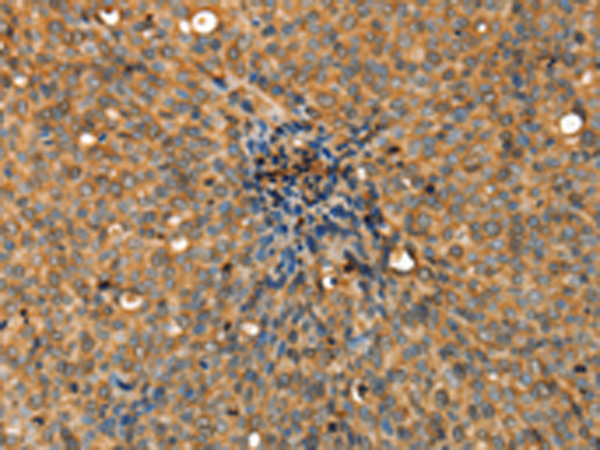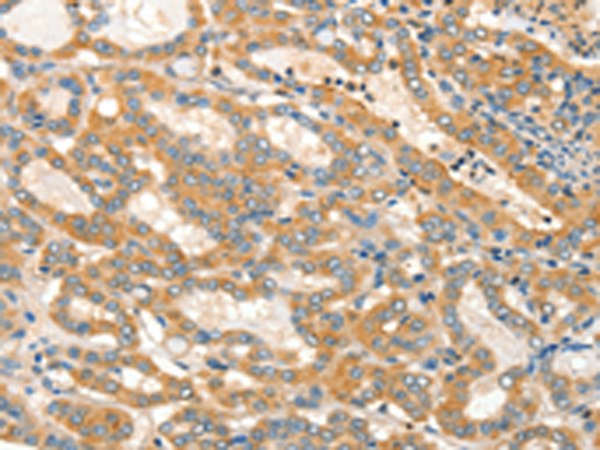

| WB | 咨询技术 | Human,Mouse,Rat |
| IF | 咨询技术 | Human,Mouse,Rat |
| IHC | 1/50-1/200 | Human,Mouse,Rat |
| ICC | 技术咨询 | Human,Mouse,Rat |
| FCM | 咨询技术 | Human,Mouse,Rat |
| Elisa | 1/1000-1/5000 | Human,Mouse,Rat |
| Aliases | AC3 |
| Host/Isotype | Rabbit IgG |
| Antibody Type | Primary antibody |
| Storage | Store at 4°C short term. Aliquot and store at -20°C long term. Avoid freeze/thaw cycles. |
| Species Reactivity | Human, Mouse, Rat |
| Immunogen | Fusion protein of human ADCY3 |
| Formulation | Purified antibody in PBS with 0.05% sodium azide and 50% glycerol. |
+ +
以下是关于ADCY3抗体的3篇参考文献的简要概括:
1. **文献名称**:*ADCY3 regulates body weight and insulin sensitivity in obesity*
**作者**:Grondin et al.
**摘要**:该研究利用ADCY3特异性抗体,通过免疫印迹和免疫组化分析发现,ADCY3在肥胖小鼠的下丘脑和脂肪组织中表达异常,其缺失导致能量代谢紊乱和胰岛素抵抗。
2. **文献名称**:*Adenylyl cyclase 3 modulates hepatic lipid metabolism via cAMP signaling*
**作者**:Li et al.
**摘要**:研究使用ADCY3抗体检测肝脏组织中ADCY3的分布,发现其在脂质代谢中的关键作用,ADCY3敲除小鼠表现出肝脏脂肪堆积减少,提示其通过cAMP通路调控脂质合成。
3. **文献名称**:*ADCY3 mutations disrupt primary cilia signaling and contribute to obesity*
**作者**:Siljee et al.
**摘要**:通过ADCY3抗体标记,揭示了ADCY3在纤毛信号传导中的功能,发现其基因突变与人类肥胖相关,并影响纤毛依赖的瘦素信号通路。
4. **文献名称**:*Antibody-based profiling of ADCY3 in neurodegenerative disorders*
**作者**:Wang et al.
**摘要**:利用ADCY3抗体对阿尔茨海默病患者脑组织进行分析,发现ADCY3表达水平与神经炎症和淀粉样蛋白沉积相关,提示其潜在病理作用。
以上研究均通过ADCY3抗体进行蛋白定位或功能分析,聚焦于代谢疾病、神经退行性病变等领域。
ADCY3 (adenylyl cyclase 3) is a membrane-bound enzyme that catalyzes the conversion of ATP to cyclic AMP (cAMP), a critical secondary messenger in cellular signaling. It belongs to the adenylate cyclase family and is prominently expressed in olfactory cilia, pancreatic β-cells, adipose tissue, and brain regions. ADCY3 plays a key role in G protein-coupled receptor (GPCR) signaling pathways, modulating processes like odor detection, insulin secretion, and energy metabolism. Genetic studies link ADCY3 mutations to obesity, type 2 diabetes, and congenital anosmia, highlighting its physiological significance.
ADCY3 antibodies are essential tools for studying its expression, localization, and function. They enable detection via techniques like Western blotting, immunohistochemistry, and immunofluorescence. Research using these antibodies has revealed ADCY3’s involvement in metabolic disorders, neurodegenerative diseases, and cancer progression. For example, altered ADCY3 expression is observed in colorectal cancer and glioblastoma, suggesting potential therapeutic targeting. Commercial ADCY3 antibodies are typically raised against specific epitopes, with validation in knockout models to ensure specificity. Recent studies also explore ADCY3’s role in ciliopathies and its interaction with signaling proteins like Gαs. Continued interest in ADCY3 antibodies supports ongoing investigations into its mechanistic roles and therapeutic applications.
×